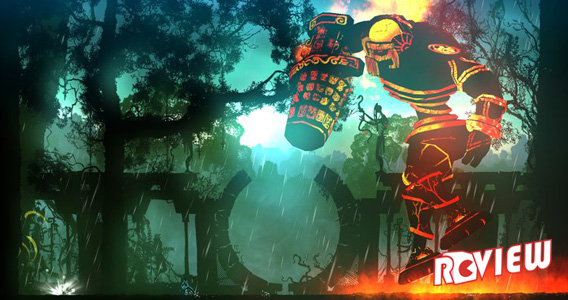
A simulated wind raised the orchestral tension as I ran along the back of a flying serpent, dodging falling explosives while waiting for the chance to strike at the key points that beast ferociously sought to protect. This was around the time it occurred to me that anyone who yearns for developers to be given the time and freedom to create memorable and compelling gaming experiences, will undoubtedly fall in love with Outland, perhaps as severely as I have for the girl I immediately yearned to show that same sequence to.
The play of that boss encounter reminded me of Ico, and there is certainly a much longer list of titles that came to mind throughout the experience – few of which need to be named given the way Outland doesn’t simply patch together a quilt of influences, rather taking inspiration into its own folds to weave a game worthy of the player’s investment.
The lingering importance of citing those influences is that Outland shines with the energy of a game designed by people who don’t just enjoy games on some theoretical level, but enjoy playing games. In fact, Outland will convince you that the team at Housemarque grew up loving the same games you did, assuming you burned candles late into the night playing through the same who’s-hot list of 2D titles old-school gamers look back on today with teary-eyed nostalgia.
The only game that can’t escape mentioning is Treasure’s Ikaruga, the light and dark trickery of which gives Outland the means to teach a few new tricks of its own, giving the mechanics of the shooter strange but stable new legs to walk upon the land with.
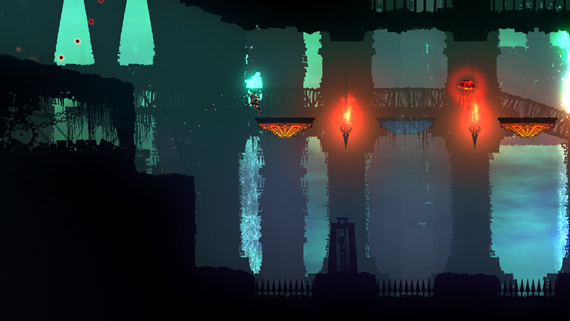
The story of Outland involves an ancient tale of life and death, a world ruled over by two goddesses who keep company with the type of mythological creatures that help create and stabilize that world, but also, and perhaps more importantly, make excellent stage bosses should the entire party decide to turn evil. The narrative only needs to drop in for visits to offer vague background for such creatures along the way, and does a reasonably good job of confining itself to that role. All players really need to know is that they are linked to an ancient hero that once brought harmony, and in grand videogame fashion, it’s once again time for a hero to rise.
With that settled, players are set loose in a visually arresting world, where the backdrops can’t help but remind me of Genndy Tartakovsky’s Samurai Jack – well defined while also subtle and loose enough to accentuate the foreground with a sense of wonder while never distracting attention from the central play of events. Characters in the foreground are defined by shape and the bend of light that wraps around their frames, leaving a faint and primitive impression of Tron.
Blue and red dominate the palette of softer background colors, tying into the dark & light / life & death theme at the heart of Outland. But that priority of color also provides the central mechanic for players while exploring the sprawling playground of platforming challenges. Gaining the ability to switch between blue and red early on in the game with the tap of a button, Outland takes the key gimmick of Ikaruga and allows players to protect themselves from the blue and red projectiles and bullets that attempt to fill so many screens by matching their color. Establishing this mechanic, the game then proceeds to torment players with an endless array of platforming puzzles and enemies that challenge the ability to switch between those two colors on the fly while dodging and fighting to survive.
Additionally, while matching the hero’s color to a fountain of bullets allows him to absorb them without damage, enemies in the crossfire can only be defeated when player’s change to the opposite color of them. Naturally this provides even greater spaces for some truly fiendish scenarios from the developers, and I was a bit taken aback at how difficult it can be to keep track of alternating between two colors while performing all the regular tasks a platforming title demands.
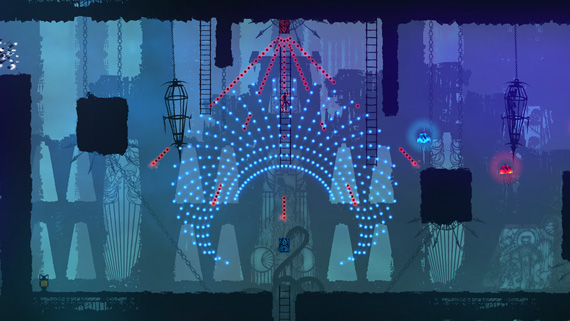
The number of varying platforming obstacles the game provides while challenging the player’s ability to switch back and forth between colors to overcome them is earnestly staggering. Numerous moving platforms might require you to be red while a rain of blue bullets hails down, other spots change the color of fire while shooting – those are only two quick examples, but there are so many damn ways to leave you scratching your head after dying, nearly all of those challenges requiring a high degree of momentum and quick thinking. As easy as it is to fall into this game, sometimes there’s nothing to do but walk away and splash some water on your face before returning for another attempt – the amount of times I proclaimed a retry to be my last of the night quickly reached ludicrous levels.
Abilities that are gained along the way help ease the tension, specifically the ability to absorb and fire back bullets, or fire blasts of energy at enemies – all of it draining a meter that, like the health bar, can be upgraded by finding purchase points and trading in the piles of gold found throughout that world.
Driving the bullet dodging and clashing of swords is the rather predictable need to hit switches to open new pathways, thereby finding keys needed to reach the stage bosses. Oddly, this never came off as tedious, and I rarely needed the map given the way the game does a genuinely good job of directing players through large areas. Even battling a giant spider boss seemed fresh, which I consider a great accomplishment.
Perhaps enemy diversity helps fend off that threat of tedium – players will quickly become familiar with the various soldier enemies and insects, but odd surprises continue to emerge while digging deeper. It seems important to convey an idea that the color switching mechanic doesn’t simply distract and keep tedium at bay, but continually finds ways to layer new encounters over the familiar.
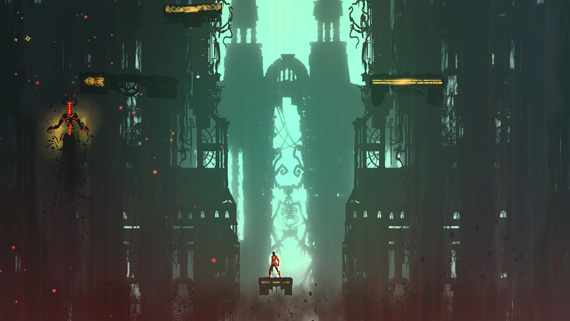
And then there are the boss encounters, which start off with a predictable foot forward but then detour into multi-stage events that challenge the player’s endurance – firstly because they become difficult in the mix of color swapping and platforming acrobatics required to defeat them, and secondly because dying sends you all the way back to the start. And I won’t sugar-coat the fact that dying numerous times halfway through one of these longer battles stirred homicidal tendencies deep within my person – again, take a break and splash some water on your face. In the end I simply can’t hold a grudge against such finely crafted sequences – these are some of the most well designed and executed 2D boss encounters you’re going to find anywhere in a new digital release – aided by a set of tight and straightforward controls.
I’m also as smitten as I am stunned that a game that could have easily coasted through positive reviews on the merits of the single-player mode went ahead and added co-operative options that allow players to tackle challenges together.
Outland is a prime example of how I’ve come to understand the creation of great and memorable works – that we as potential creators are the sum of our experiences, unavoidably drawn to create fresh works of importance that are inherently influenced by those experiences. And while Outland certainty brings out the best of titles that have come before it in that way, the game also offers fresh ground for other ideas to take root and carry us forward into new and playful experiences that don’t simply “push the pixels” as they say, but rather tempt us with open spaces not just in which to dream, but to truly enjoy the act of playing.
Housemarque
Publisher
Ubisoft
System
Xbox 360 (Xbox LIVE Arcade), PlayStation 3 (PSN) (Xbox 360 Reviewed)
Modes
Singleplayer, Multiplayer, Co-op
Release Date
April 27, 2011 Xbox LIVE Arcade, TBD PlayStation Network
Price
$9.99 (PSN), 800 Microsoft Points (XBLA)
*A copy of this title was provided by the publisher for review
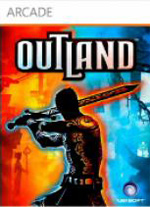
I want it.
Comment by Brad Johnson — May 1, 2011 @ 8:33 pm
Darn… I forgot about this release… must remedy that shortly.
Comment by Ujn Hunter — June 10, 2011 @ 1:50 pm